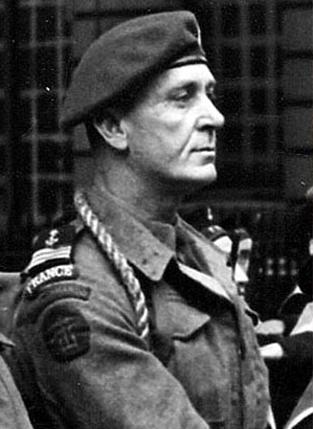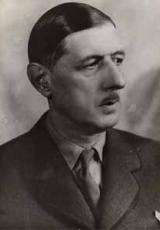Philippe Kieffer

Source: Foundation of the France Libre
(24th October 1899: Port-au-Prince, Haiti - 20th November 1962: Cormeilles-en-Parisis, Val-d'Oise)
Philippe Kieffer was Alsatian by birth through his teacher father, whose family had fled from Otterswiller to Jamaica following the German annexation of 1870, and British through his mother. Having only just completed his studies as a reserve officer in 1918, nothing short of a literally Rhinian throwback to shed his blood for his homeland could have predisposed him for a career in the armed services. A graduate of the Upper College of Business Studies, he had followed a career as a banker in North America until the age of forty. However, he volunteered as a reserve officer at the beginning of the Second World War. On the 10th September 1939 he was a sub- lieutenant in the navy after a first tour of duty in the land army, carrying out the role of interpreter on board the battleship Courbet. At Dunkirk, assigned to Admiral Nord's general staff, he witnessed the invasion of the Wehrmacht in May 1940 and on the 19th June decided to support General de Gaulle in London. He joined the ranks of the Free French (France Libre) Naval Forces on the very day they were created, the 1st July 1940. As an Interpreter and Cipher Officer, he understood the importance of British commandos and set up a unit of French Naval Fusiliers in Portsmouth in May 1941: the 1st Company of the Battalion of Marine Fusilier Commandos (1re compagnie du bataillon de fusiliers-marins commandos or BFMC). Trained at the commando training centre in Achnacarry, it did not take long for the twenty or so volunteers to become involved in the operations of the 2nd Unit of British Commandos: promoted to Ship-of-the-Line Lieutenant on the 1st July 1942, Kieffer led his men to Dieppe on the 19th August 1942. The BFM, increased by a company, took part in preparatory raids in Normandy with a view to landing in 1943, covering themselves with even more glory the following year in Lieutenant Colonel Dawson's famous 4th British Commandos belonging to General Lord Lovat's 1st Brigade. On the 6th June, his Green Berets landed on "Sword" beach in Ouistreham, breaking through in Colleville, Saint-Aubin-d'Arquenay, Amfreville and Bavant to join up with British airborne troops at Benouville (Pegasus Bridge). Wounded at the beginning of the assault, the Lieutenant Commander remained with his comrades in arms for a further two days before being evacuated, rejoining his unit on the 13th July for the advance on Honfleur.
From Normandy, he rushed to Paris with two of his men and was the first to enter the city. In October 1944, his battalion, increased by a company, was sent to the Netherlands for an assault on the island of Walcheren. His marine fusiliers took Flessinge, the key to the port of Anvers, continuing the liberation of the Dutch islands through concerted operations with British commandos. At the end of the war, he was on the inter-allied general staff before leaving active service to work on the reconstruction of the country on the 1945consultative committee, becoming involved on a local level with terms in office as General Councillor for the Calvados region (September 1945 - June 1946) and Town Councillor for Grandcamp-les-Bains. He published his book of memoirs, Béret vert (Green Beret) in 1948 and was appointed Captain of Frigate six years later in 1954. He was an advisor for the film The Longest Day in 1965 before he died on the 20th November the same year. He was laid to rest in the cemetery at Grandcamp-les-Bains. In homage to this servant of France, the 6th Battalion of Commandos, established on the 6th June 2008, bears the name of Marine Commando "Kieffer". Located in Lorient, this company specialising in new technologies is a strong maritime unit belonging to the force of marine fusiliers and commandos (force des fusiliers marins et commandos or FORFUSCO).


